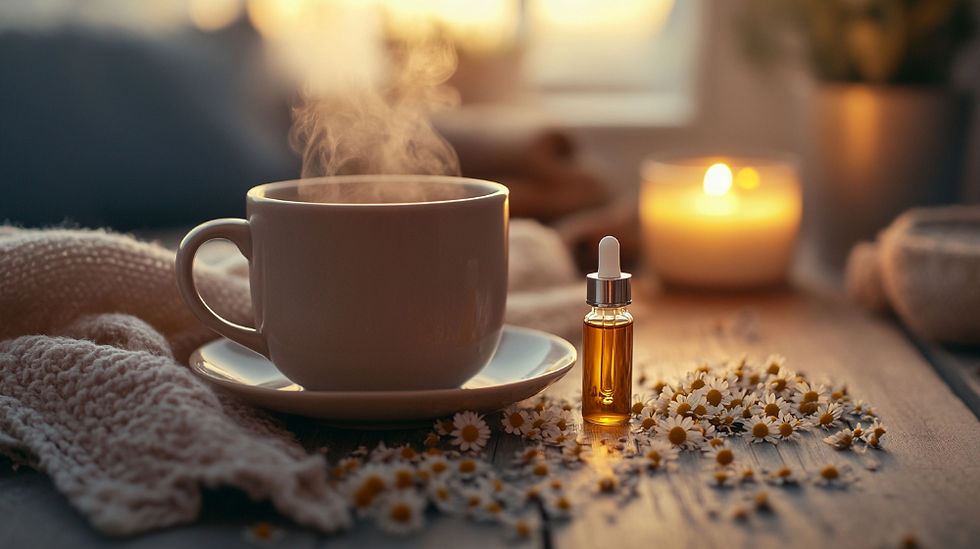"Herbal Tea vs. CBD: Which Is Better for Anxiety?"
- Veridiana Correia
- Apr 14, 2025
- 4 min read
Updated: Jun 5, 2025

Anxiety is everywhere these days. Whether it's daily stress, social pressure, or that vague, nagging sense of unease, more and more people are looking for natural ways to calm their minds and two remedies keep popping up: herbal tea and CBD.
Both have roots in plant medicine. Both promise relaxation. And both are rising stars in the wellness world.
But how do they actually compare? Can a calming cup of chamomile hold its own against a few drops of CBD oil? And which one is better for your type of anxiety?
In this guide, we’re going to break it all down benefits, science, timing, side effects to help you choose what works best for your body and mind.
What Is Herbal Tea, and How Does It Help with Anxiety?
Herbal tea isn’t technically “tea” (it doesn’t contain Camellia sinensis, the tea plant), but it’s been a powerful healing ritual for thousands of years. Made from flowers, roots, leaves, and seeds, herbal tea is caffeine-free and naturally calming — which is exactly what makes it great for anxiety.
Best Herbal Teas for Anxiety:
Lavender: Known for its soothing aroma, it also works internally to lower stress levels.
Lemon Balm: Uplifting and relaxing, it’s been shown to reduce cortisol and ease irritability.
Passionflower: Traditionally used for nervous restlessness and racing thoughts.
Ashwagandha or Tulsi (Holy Basil): Adaptogenic herbs that help the body regulate stress.
Benefits of Herbal Tea for Anxiety:
Easy to make and sip daily.
Supports ritual and mindfulness.
No risk of dependency.
Can be blended with other calming herbs.
Drawbacks:
May take longer to notice effects.
Mild compared to CBD or pharmaceuticals.
Needs consistency to be most effective.
💡 Pro tip: Drink herbal tea at the same time every day to build a soothing ritual that signals your body it’s time to relax.
What Is CBD, and How Does It Help with Anxiety?
CBD, short for cannabidiol, is a non-psychoactive compound found in hemp (a variety of cannabis). Unlike THC, it won’t get you high but it will interact with your endocannabinoid system, which plays a big role in stress regulation, mood, and sleep.
How CBD Works:
CBD helps your body maintain balance (homeostasis) by influencing receptors related to serotonin and GABA — two neurotransmitters heavily involved in anxiety and relaxation.
🔬 What Science Says:
Several small studies and trials have shown promising results:
One study showed that 300 mg of CBD significantly reduced anxiety during public speaking.
Another found that CBD improved sleep quality and reduced anxiety in individuals with chronic stress disorders.
✅ Benefits of CBD for Anxiety:
Fast-acting for some people (within 30 minutes)
Available in many forms (oil, gummies, capsules, infused teas)
Can help with both physical tension and mental overthinking
⚠️ Drawbacks:
May cause drowsiness or interact with medications
Not legal in every region
Varies widely in quality and dosage
💡 Pro tip: Always start low and go slow with CBD — especially if you’re new to it.
Herbal Tea vs. CBD: Head-to-Head Comparison
Let’s break it down side-by-side so you can see which might work better for your anxiety needs:
Herbal Tea | CBD (Cannabidiol) | |
How it works | Soothes the nervous system naturally | Interacts with the endocannabinoid system |
Common Benefits | Reduces stress, improves sleep | Reduces anxiety, inflammation, improves focus |
Time to feel | 10–30 minutes after sipping | 15–60 minutes (depends on form used) |
Best for | Daily calming ritual | Stronger symptoms or occasional spikes |
Side effects | Rare (may cause drowsiness) | Possible drowsiness, dry mouth, interactions |
Ease of use | Simple, ritualistic (brew & sip) | Requires dosage awareness and consistency |
👉 In short: Herbal tea is ideal for daily calming rituals and sleep, while CBD may be better for stronger
or acute anxiety relief.
Can You Combine Herbal Tea and CBD?
Absolutely. In fact, many herbal teas now include CBD for a dual-action effect. Chamomile + CBD is a popular bedtime blend that works on both the body and the brain.
Tips for combining:
Try a CBD-infused tea with herbs like lemon balm or passionflower.
Be mindful of dosage even small amounts of CBD can be effective.
Always check for third-party lab tests on any CBD product.
💬 “It’s not one or the other — sometimes the best solution is a gentle combination that fits your lifestyle.”
Which One Should You Try First?
If you're new to natural remedies:
Start with herbal tea if you prefer rituals, enjoy slow, sensory self-care, or want a caffeine-free wind-down routine.
Try CBD if your anxiety feels intense, persistent, or if you’ve already tried herbal tea and need a bit more support.
Some people even alternate both tea in the evening, CBD when anxiety spikes.
Final Thoughts: Choose What Feels Right for You
Herbal tea and CBD both offer beautiful, plant-powered ways to manage anxiety naturally. You don’t have to pick one over the other forever try both, see how your body responds, and build a routine that brings you peace.
There’s no one-size-fits-all when it comes to mental wellness. Just small, daily choices that support your calm one cup or drop at a time.





Comments